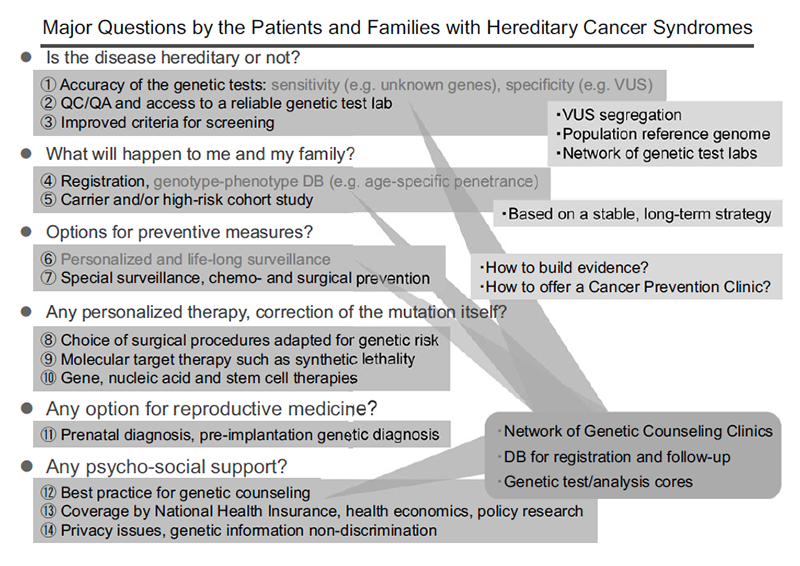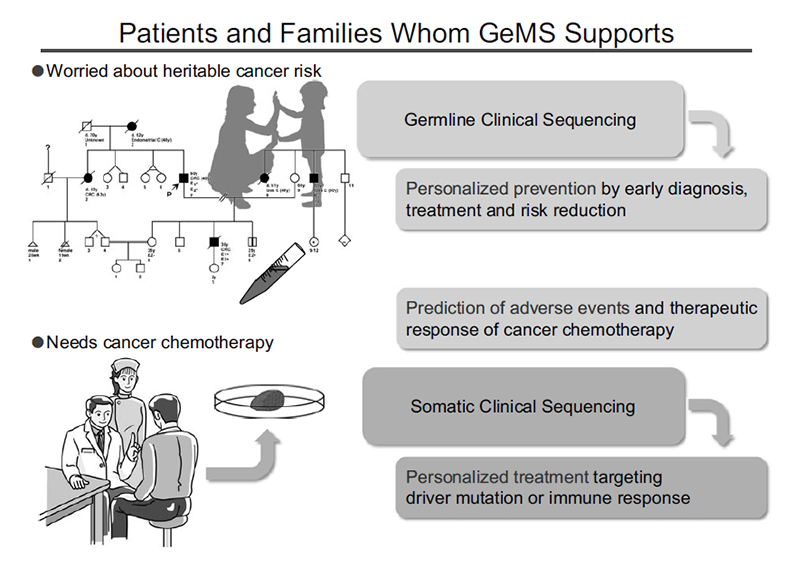Annual Report 2020
Department of Genetic Medicine and Services
Teruhiko Yoshida, Makoto Hirata, Kokichi Sugano, Narikazu Boku, Shigenobu Suzuki, Mitsuya Ishikawa, Tadashi Kumamoto, Nobuyoshi Hiraoka, Shigeki Sekine, Taisuke Mori, Kuniko Sunami, Noboru Yamamoto, Takahisa Matsuda, Hiromi Sakamoto, Mineko Ushiama, Kumiko Seto, Chino Udagawa, Takashi Kohno, Mamoru Kato, Hitoshi Ichikawa, Noriko Tanabe, Sayuri Hiraoka, Tomoko Watanabe
Introduction
It has been estimated that roughly 5% of all cancer cases are caused by a highly penetrant monogenic mutation. The major causative genes for most hereditary cancer syndromes were identified in the 1990s. Since then, genetic diagnosis has been considered as a part of standard medical care in oncology clinics. The National Cancer Center Hospital (NCCH) launched the Outpatient Genetic Counseling Clinic in 1998 as part of a collaboration with the NCC Research Institute, specifically the Fundamental Innovative Oncology Core (FIOC). However, several issues remain to be addressed in cancer medical genetics, as summarized in Figure 1.

The Team and What We Do
The Department of Genetic Medicine and Services (GeMS) consists of 13 doctors, 8 researchers, and 2 genetic counselors. All staff members hold a concurrent post with another department and research division, except for the genetic counselors.
As shown on the NCCH website, the aim and mission of the clinical service of the Outpatient Genetic Counseling Clinic, which also serves as the major routine clinical activities of our department, are:
1) To provide consultation and appropriate medical and genetic information (i. e., genetic counseling) to anyone who has a concern related to heredity cancer.
2) To provide genetic testing when appropriate.
3) To support early diagnosis and treatment based on family history and/or genetic test results.
4) To discuss clinical sequencing results of patients by participating in the expert panel.
For the period of April 2020 to March 2021, 361 clients and their relatives visited the clinic. Of these, 185 families and 243 clients were classified as new visits. In total, 1,859 families have visited the clinic since its inception in 1998. Details are presented in Table 1.
Table 1. Number of new clients (Apr. 2020 – Mar. 2021) 

Research activities
Although at least one causative gene has been identified for each of the major hereditary cancer syndromes, the overall sensitivity of the current genetic tests is far from 100% and may be around 70%-80%, even for the cases that meet the clinical and/or screening criteria for hereditary cancer syndromes. The false negative cases may include both inadequate technical sensitivity of current genetic test methods on the established causative genes (allelic heterogeneity) as well as yet-to-be-identified genes representing locus heterogeneity. The introduction of next-generation sequencers (NGS) has carried great expectations in changing this situation. The staff of the Department of GeMS have established a new Common Protocol to perform NGS-based germline clinical sequencing for patients with negative test results from conventional genetic tests, who would otherwise represent a part of the Undiagnosed Disease Patients in the oncology field. The Common Protocol has been adopted by other hospitals and institutions in a long-standing multi-institute collaborative research group based on the National Cancer Center Research and Development Fund and its predecessor. In addition to whole-exome/whole-genome sequencing (WES/WGS), a multi-gene panel has been developed based on Agilent SureSelect technology.
Clinical trials
We have participated in an expert panel of clinical sequencing conducted by health insurance systems since May 29, 2019.
Education
The department has accepted attendees for outpatient genetic counseling to obtain eligibility for taking the examination for clinical geneticists and certified genetic counselors acknowledged by the Japan Society of Human Genetics and the Japanese Society for Genetic Counseling. In 2020, five doctors registered as trainees for clinical geneticists in the education committee of clinical geneticists. Furthermore, this year, we accepted 10 students of the genetic counseling course in the Graduate School of Health and Welfare Sciences, International University of Health and Welfare and one graduate student in Keio University.
Future Prospects
The Department of GeMS was launched in November 2015. Although this section reports on the routine clinical activity of the department and clinical research directly associated with the Outpatient Genetic Counseling Clinic, the scope and mission of this department extend beyond hereditary cancer syndromes and include support of the genomic biomarker-driven personalized cancer treatments offered by other clinical departments (Figure 2). The core technology of the new discipline, also known as precision medicine, lies with next-generation sequencers, which would bring massive amounts of genomic data for cancer diagnosis, treatment and prevention. The crux of this emerging opportunity is converting the sequence data to clinically valid and useful knowledge, which could include incidental or secondary findings. The Department of GeMS expects to support other departments in the era of genomic medicine.

List of papers published in 2020
Journal
1. Cho H, Yamada M, Sekine S, Tanabe N, Ushiama M, Hirata M, Ogawa G, Gotoh M, Yoshida T, Yoshikawa T, Saito Y, Kuchiba A, Oda I, Sugano K. Gastric cancer is highly prevalent in Lynch syndrome patients with atrophic gastritis. Gastric Cancer, 24:283-291, 2021
2. Ohmomo H, Komaki S, Ono K, Sutoh Y, Hachiya T, Arai E, Fujimoto H, Yoshida T, Kanai Y, Sasaki M, Shimizu A. Evaluation of clinical formalin-fixed paraffin-embedded tissue quality for targeted-bisulfite sequencing. Pathol Int, 71:135-140, 2021
3. Kohsaka S, Hirata M, Ikegami M, Ueno T, Kojima S, Sakai T, Ito K, Naka N, Ogura K, Kawai A, Iwata S, Okuma T, Yonemoto T, Kobayashi H, Suehara Y, Hiraga H, Kawamoto T, Motoi T, Oda Y, Matsubara D, Matsuda K, Nishida Y, Mano H. Comprehensive molecular and clinicopathological profiling of desmoid tumours. Eur J Cancer, 145:109-120, 2021
4. Naoi D, Koinuma K, Sasanuma H, Sakuma Y, Horie H, Lefor AK, Sugano K, Ushiama M, Yoshida T, Sata N. Solid-pseudopapillary neoplasm of the pancreas in a patient with familial adenomatous polyposis: a case report. Surg Case Rep, 7:35, 2021
5. Yoshihama T, Hirasawa A, Sugano K, Yoshida T, Ushiama M, Ueki A, Akahane T, Nanki Y, Sakai K, Makabe T, Yamagami W, Susumu N, Kameyama K, Kosaki K, Aoki D. Germline multigene panel testing revealed a BRCA2 pathogenic variant in a patient with suspected Lynch syndrome. Int Cancer Conf J, 10:6-10, 2021
6. Watanabe T, Honda T, Totsuka H, Yoshida M, Tanioka M, Shiraishi K, Shimada Y, Arai E, Ushiama M, Tamura K, Yoshida T, Kanai Y, Kohno T. Simple prediction model for homologous recombination deficiency in breast cancers in adolescents and young adults. Breast Cancer Res Treat, 182:491-502, 2020
7. Lin Y, Nakatochi M, Hosono Y, Ito H, Kamatani Y, Inoko A, Sakamoto H, Kinoshita F, Kobayashi Y, Ishii H, Ozaka M, Sasaki T, Matsuyama M, Sasahira N, Morimoto M, Kobayashi S, Fukushima T, Ueno M, Ohkawa S, Egawa N, Kuruma S, Mori M, Nakao H, Adachi Y, Okuda M, Osaki T, Kamiya S, Wang C, Hara K, Shimizu Y, Miyamoto T, Hayashi Y, Ebi H, Kohmoto T, Imoto I, Kasugai Y, Murakami Y, Akiyama M, Ishigaki K, Matsuda K, Hirata M, Shimada K, Okusaka T, Kawaguchi T, Takahashi M, Watanabe Y, Kuriki K, Kadota A, Okada R, Mikami H, Takezaki T, Suzuki S, Yamaji T, Iwasaki M, Sawada N, Goto A, Kinoshita K, Fuse N, Katsuoka F, Shimizu A, Nishizuka SS, Tanno K, Suzuki K, Okada Y, Horikoshi M, Yamauchi T, Kadowaki T, Yu H, Zhong J, Amundadottir LT, Doki Y, Ishii H, Eguchi H, Bogumil D, Haiman CA, Le Marchand L, Mori M, Risch H, Setiawan VW, Tsugane S, Wakai K, Yoshida T, Matsuda F, Kubo M, Kikuchi S, Matsuo K. Genome-wide association meta-analysis identifies GP2 gene risk variants for pancreatic cancer. Nat Commun, 11:3175, 2020
8. Fujita M, Liu X, Iwasaki Y, Terao C, Mizukami K, Kawakami E, Takata S, Inai C, Aoi T, Mizukoshi M, Maejima K, Hirata M, Murakami Y, Kamatani Y, Kubo M, Akagi K, Matsuda K, Nakagawa H, Momozawa Y. Population-based Screening for Hereditary Colorectal Cancer Variants in Japan. Clin Gastroenterol Hepatol, 2020
9. Mizukami K, Iwasaki Y, Kawakami E, Hirata M, Kamatani Y, Matsuda K, Endo M, Sugano K, Yoshida T, Murakami Y, Nakagawa H, Spurdle AB, Momozawa Y. Genetic characterization of pancreatic cancer patients and prediction of carrier status of germline pathogenic variants in cancer-predisposing genes. EBioMedicine, 60:103033, 2020
10. Ishigaki K, Akiyama M, Kanai M, Takahashi A, Kawakami E, Sugishita H, Sakaue S, Matoba N, Low SK, Okada Y, Terao C, Amariuta T, Gazal S, Kochi Y, Horikoshi M, Suzuki K, Ito K, Koyama S, Ozaki K, Niida S, Sakata Y, Sakata Y, Kohno T, Shiraishi K, Momozawa Y, Hirata M, Matsuda K, Ikeda M, Iwata N, Ikegawa S, Kou I, Tanaka T, Nakagawa H, Suzuki A, Hirota T, Tamari M, Chayama K, Miki D, Mori M, Nagayama S, Daigo Y, Miki Y, Katagiri T, Ogawa O, Obara W, Ito H, Yoshida T, Imoto I, Takahashi T, Tanikawa C, Suzuki T, Sinozaki N, Minami S, Yamaguchi H, Asai S, Takahashi Y, Yamaji K, Takahashi K, Fujioka T, Takata R, Yanai H, Masumoto A, Koretsune Y, Kutsumi H, Higashiyama M, Murayama S, Minegishi N, Suzuki K, Tanno K, Shimizu A, Yamaji T, Iwasaki M, Sawada N, Uemura H, Tanaka K, Naito M, Sasaki M, Wakai K, Tsugane S, Yamamoto M, Yamamoto K, Murakami Y, Nakamura Y, Raychaudhuri S, Inazawa J, Yamauchi T, Kadowaki T, Kubo M, Kamatani Y. Large-scale genome-wide association study in a Japanese population identifies novel susceptibility loci across different diseases. Nat Genet, 52:669-679, 2020
11. Sakaue S, Kanai M, Karjalainen J, Akiyama M, Kurki M, Matoba N, Takahashi A, Hirata M, Kubo M, Matsuda K, Murakami Y, Daly MJ, Kamatani Y, Okada Y. Trans-biobank analysis with 676,000 individuals elucidates the association of polygenic risk scores of complex traits with human lifespan. Nat Med, 26:542-548, 2020
12. Ito T, Nomizu T, Eguchi H, Kamae N, Dechamethakun S, Akama Y, Endo G, Sugano K, Yoshida T, Okazaki Y, Ishida H. The first case report of polymerase proofreading-associated polyposis in POLD1 variant, c.1433G>A p.S478N, in Japan. Jpn J Clin Oncol, 50:1080-1083, 2020
